Since its beginnings in 1968, Madeplax has evolved from the marketing of carpentry products to become a global reference in wood, aluminum, glass and steel. Adapting to market changes, the Group has diversified its services, expanding its operations internationally and establishing branches in Europe, America and Africa.
With a constant focus on quality, sustainability and innovation, Madeplax has forged strategic alliances, developed exclusive products and created infrastructures such as Plaza 3 Center in the Dominican Republic, a key center for the Caribbean. Today, the Group continues to grow, driving projects in emerging markets, strengthening its global presence and guaranteeing comprehensive solutions to its clients.
More than 50 years offering global carpentry solutions.
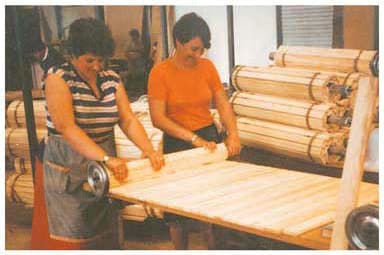
The group started its activity by marketing carpentry products, initially establishing a few commercial routes that expanded over time. To better respond to demand in terms of models, quality and delivery times, they decided to become involved in the manufacture of their own products. Thus, they set up their own factory and started producing plain and special doors to order, reaching a capacity of 1,000 doors per day with a committed team.
This growth led them to seek raw material suppliers outside their borders. With the support of the Chambers of Commerce and financing from the Bank of Monrovia, they expanded their activity in Liberia and carried out studies in Central and South America, as well as in Asia, to identify the best markets for wood supply and manufacturing. In view of the growth forecasts, they established their first branches in Manresa, Madrid and Malaga.
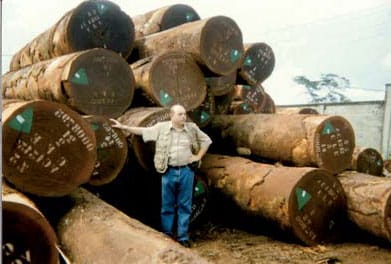
Expanding their business, they started working in the construction sector and incorporated installation services, which allowed them to strengthen their presence in the market. This new approach opened up opportunities with international suppliers and larger customers. However, the economic crisis of the late 1970s and early 1980s forced them to reduce their expansion and concentrate on the domestic market, operating mainly in Valencia, the Balearic Islands and Portugal.
Leveraging their experience in importing and manufacturing, they founded Alcama, a company that soon became the largest wood importer in Valencia, supplying carpentry and related sectors. They strengthened relationships with African suppliers, promoting responsible logging and sustainability. They diversified imports to meet European demand and achieved such a volume of trade in American timber that they gained international recognition. This success attracted the attention of U.S. and Canadian companies, with whom they established strategic alliances that further boosted their growth.
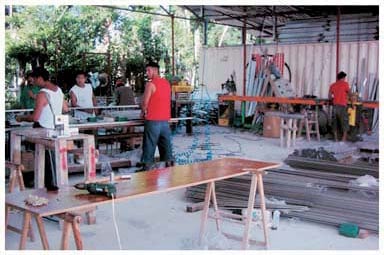
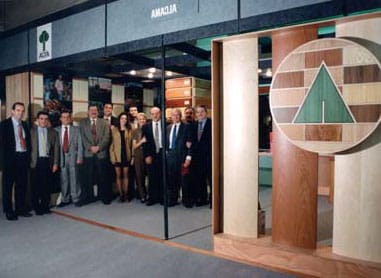
They expanded their global presence with trips to wood-producing countries and constant visits to the Caribbean, especially the Dominican Republic and Mexico. They detected a growing demand for wood, aluminum and glass carpentry by international hotel chains. To serve this market, they began to offer these new materials and developed a rigorous R&D&I program to create innovative products.
They opened branches in Ibiza and Huelva-Portugal, as well as in Bávaro (Dominican Republic), Quintana Roo (Mexico) and Montego Bay (Jamaica). Implemented mobile workshops in the Caribbean with the capacity to carry out installations anywhere in the world. They promoted the Wood Sector Hardware Fair and opened a permanent exhibition at their headquarters in L'Alcúdia.
They expanded operations in emerging markets such as Algeria, Morocco and Brazil. Their growth led to the independence of several divisions, such as lacquer, hardware, veneer and moldings. In 2007, they pre-inaugurated the first 9,000 m² of Plaza 3 Center in Bávaro, an industrial and commercial complex of more than 35,000 m² to improve service in the Caribbean. Finally, in 2008, the project was completed with a commercial area and the improvement of key infrastructure in the area.
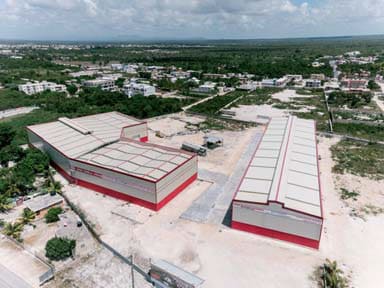
With the onset of the crisis, the Madeplax Group continued to expand in less affected regions, such as the Caribbean and Morocco, consolidating new branches and strategic alliances with factories in Spain, Brazil, the United States and Asia. These alliances enabled them to meet the demand for products and create economical and functional alternatives.
Their presence in Africa, especially in Algeria, increased, allowing them greater flexibility in serving their customers. Major hotel chains in the Caribbean continued to rely on Madeplax, extending their market to countries such as Costa Rica.
They improved the infrastructure of Plaza Tres Center and began planning a new Commercial Industrial Complex in Bávaro, destined to become a logistics and financial center. They also bet on the Asian market to develop new ideas and created a company dedicated to the search for innovative products, closing strategic alliances with manufacturers in the region. This expansion allowed them to offer innovative products, expanding their range and benefiting both suppliers and customers.

The group started its activity by marketing carpentry products, initially establishing a few commercial routes that expanded over time. To better respond to demand in terms of models, quality and delivery times, they decided to become involved in the manufacture of their own products. Thus, they set up their own factory and started producing plain and special doors to order, reaching a capacity of 1,000 doors per day with a committed team.
This growth led them to seek raw material suppliers outside their borders. With the support of the Chambers of Commerce and financing from the Bank of Monrovia, they expanded their activity in Liberia and carried out studies in Central and South America, as well as in Asia, to identify the best markets for wood supply and manufacturing. In view of the growth forecasts, they established their first branches in Manresa, Madrid and Malaga.

Expanding their business, they started working in the construction sector and incorporated installation services, which allowed them to strengthen their presence in the market. This new approach opened up opportunities with international suppliers and larger customers. However, the economic crisis of the late 1970s and early 1980s forced them to reduce their expansion and concentrate on the domestic market, operating mainly in Valencia, the Balearic Islands and Portugal.
Leveraging their experience in importing and manufacturing, they founded Alcama, a company that soon became the largest wood importer in Valencia, supplying carpentry and related sectors. They strengthened relationships with African suppliers, promoting responsible logging and sustainability. They diversified imports to meet European demand and achieved such a volume of trade in American timber that they gained international recognition. This success attracted the attention of U.S. and Canadian companies, with whom they established strategic alliances that further boosted their growth.


They expanded their global presence with trips to wood-producing countries and constant visits to the Caribbean, especially the Dominican Republic and Mexico. They detected a growing demand for wood, aluminum and glass carpentry by international hotel chains. To serve this market, they began to offer these new materials and developed a rigorous R&D&I program to create innovative products.
They opened branches in Ibiza and Huelva-Portugal, as well as in Bávaro (Dominican Republic), Quintana Roo (Mexico) and Montego Bay (Jamaica). Implemented mobile workshops in the Caribbean with the capacity to carry out installations anywhere in the world. They promoted the Wood Sector Hardware Fair and opened a permanent exhibition at their headquarters in L'Alcúdia.
They expanded operations in emerging markets such as Algeria, Morocco and Brazil. Their growth led to the independence of several divisions, such as lacquer, hardware, veneer and moldings. In 2007, they pre-inaugurated the first 9,000 m² of Plaza 3 Center in Bávaro, an industrial and commercial complex of more than 35,000 m² to improve service in the Caribbean. Finally, in 2008, the project was completed with a commercial area and the improvement of key infrastructure in the area.

With the onset of the crisis, the Madeplax Group continued to expand in less affected regions, such as the Caribbean and Morocco, consolidating new branches and strategic alliances with factories in Spain, Brazil, the United States and Asia. These alliances enabled them to meet the demand for products and create economical and functional alternatives.
Their presence in Africa, especially in Algeria, increased, allowing them greater flexibility in serving their customers. Major hotel chains in the Caribbean continued to rely on Madeplax, extending their market to countries such as Costa Rica.
They improved the infrastructure of Plaza Tres Center and began planning a new Commercial Industrial Complex in Bávaro, destined to become a logistics and financial center. They also bet on the Asian market to develop new ideas and created a company dedicated to the search for innovative products, closing strategic alliances with manufacturers in the region. This expansion allowed them to offer innovative products, expanding their range and benefiting both suppliers and customers.